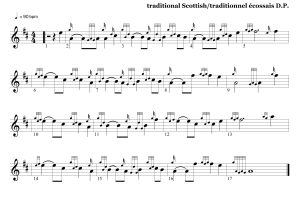© ericdentinger.com
2008-2026
Eric Maclewis - BAGPIPE SOUNDS
Eric Maclewis
- version originale en Scots -
(Robert Burns 1788 & 1796 & trad.)
Should auld acquaintance be forgot
And never brought to mind?
Should auld acquaintance be forgot
And auld lang syne!
For auld lang syne, my dear
For auld lang syne
We'll tak a cup o' kindness yet
For auld lang syne
And surely ye'll be your pint stowp! (*)
And surely I'll be mine!
And we'll tak a cup o'kindness yet
For auld lang syne
(chorus)
We twa hae run about the braes
And pou'd the gowans fine
But we've wander'd mony a weary fit
Sin' auld lang syne
(chorus)
We twa hae paidl'd in the burn
Frae morning sun till dine
But seas between us braid hae roar'd
Sin' auld lang syne
(chorus)
And there's a hand, my trusty fere!
And gie's a hand o' thine!
And we'll tak a right gude-willie waught
For auld lang syne
(chorus)
(*) pint stowp = tankard (Eng.) - chope (Fr.)
Rod Stewart
(Stirling Castle - 2012)
Auld Lang Syne
- adapté anglais moderne -
(Robert Burns & trad.)
Should old acquaintance be forgot
And never brought to mind?
Should old acquaintance be forgot
And the days of auld lang syne
For auld lang syne, my dear
For auld lang syne
We'll drink a cup of kindness yet
For the sake of auld lang syne
And surely you will buy your cup
And surely I'll buy mine
We'll take a cup of kindness yet
For the sake of auld lang syne
(chorus)
We two have run about the slopes
And pulled the daisies fine
But we've wandered many a weary foot
Since the days of auld lang syne
(chorus)
We two have paddled in the stream
From morning sun till night
But seas between us broad have roared
Since the days of auld lang syne
(chorus)
And there's a hand, my trusty friend
And give us a hand of yours
And we will take a goodwill draught
For the sake of auld lang syne
(chorus)
Peu de gens savent en France que derrière le fameux Ce n'est qu'un Au Revoir se cache un très vieil air écossais…
On retrouve des traces de l'air (ou au moins du propos général de la chanson) dans une complainte présente dans un manuscrit du XVIème siècle (Bannatyne Manuscript).
Le célèbre premier vers « Should old acquaintance be forgot » ainsi que l'expression « Auld Lang Syne » (qu'on peut traduire par "il y a longtemps" ou "il était une fois") semblent quant à eux apparaître pour la première fois dans un poème du XVIIème siècle publié en 1711 (Watson's Choice Collection of Scots Poems).
La mélodie actuelle est semble-t-il directement reliée à deux airs de strathspey employés en Scottish Country Dance :
The Miller's Wedding (Bremner's Scots Reels - 1759) ou The Miller's Daughter (Cumming's Strathspeys - McGlashan's Strathspey Reels - 1780).
D'autres airs semblent se calquer sur la structure de cette mélodie qu'on peut donc aussi peu ou prou retrouver avec Sir Alexander Don's Strathspey, Coming Thro' The Rye, etc…
Les paroles, constituant une ode à l'amitié, sont attribuées à Robert Burns depuis leur publication en 1796. Toutefois, de l'aveu même du poète écossais, l'essentiel du texte est bien antérieur, Burns l'ayant complété de deux couplets.
La transposition française (1920), désormais officialisée par Ce n'est qu'un au revoir, est due à Jacques Sevin, un acteur essentiel du scoutisme en France.
Auld Lang Syne s'est imposé dans le monde anglo-saxon en tant que mélodie du nouvel an sous l'impulsion de l'orchestre du canadien Guy Lombardo à partir de 1929.
À l'instar d'Amazing Grace, sa popularité est internationale, en particulier en Extrême-Orient.
Par effet de feed-back, l'air est bien sûr revenu en force en Ecosse dans les festivités d'Hogmanay (nuit de la St Sylvestre) ainsi que pour clôturer plusieurs types d'évènements traditionnels (Burns nights, ceilidhs, etc…) ou d'autres cérémonies.
Red Hot Chilli Pipers
GAELIC AIR
AULD LANG SYNE
Sur l'album (2ème air)
- noté par Eric Maclewis sur CelticPipes









